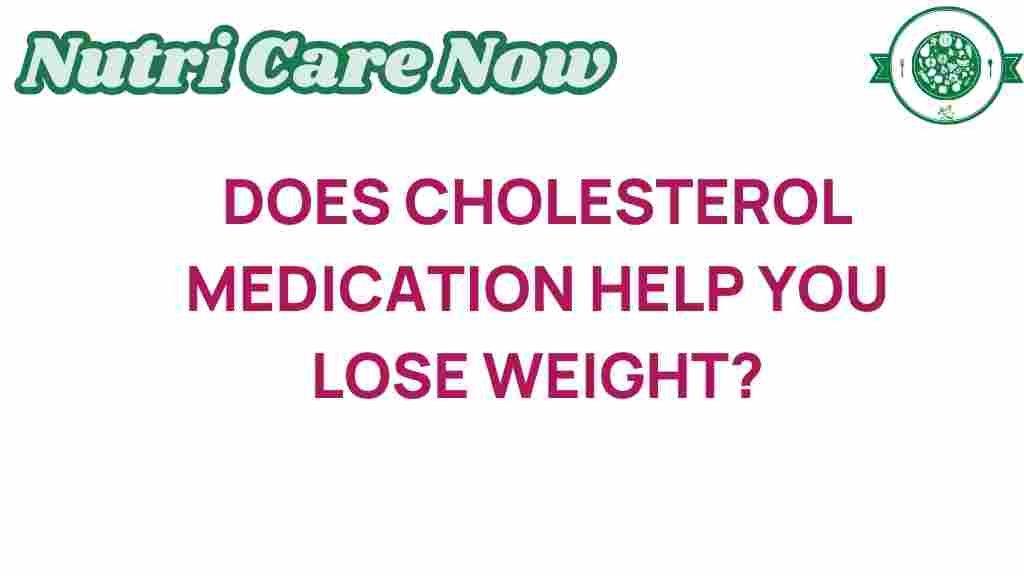Can Cholesterol Medication Be the Key to Weight Loss Success?
In the quest for effective weight loss solutions, many individuals often overlook the role of cholesterol medication. While these medications are primarily designed to manage cholesterol levels and reduce the risk of cardiovascular diseases, emerging research suggests they may also have unexpected benefits related to weight loss. This article explores the potential connections between cholesterol medication and weight management, the underlying mechanisms, and how lifestyle changes can enhance overall wellness.
Understanding Cholesterol Medication
Cholesterol medications, commonly known as statins, are prescribed to lower low-density lipoprotein (LDL) cholesterol levels in the blood. High LDL cholesterol is a significant risk factor for obesity and heart-related illnesses. Statins work by inhibiting the enzyme HMG-CoA reductase, which plays a central role in the body’s cholesterol production.
- Types of Cholesterol Medications:
- Statins (e.g., Atorvastatin, Simvastatin)
- Bile Acid Sequestrants (e.g., Cholestyramine)
- Cholesterol Absorption Inhibitors (e.g., Ezetimibe)
- PCSK9 Inhibitors (e.g., Alirocumab)
- Benefits of Cholesterol Medication:
- Lowering LDL cholesterol levels
- Reducing the risk of heart attacks and strokes
- Potentially aiding in weight loss
The Link Between Cholesterol Medication and Weight Loss
While the primary purpose of cholesterol medication is to maintain healthy cholesterol levels, studies indicate that these medications might indirectly contribute to weight loss. Here are some key points regarding the relationship between cholesterol medication and weight management:
- Improved Metabolism: Some statins may enhance metabolic rates, potentially leading to weight loss.
- Reduction in Inflammation: Cholesterol medications can reduce inflammation in the body, which is often linked to obesity.
- Behavioral Changes: Patients on cholesterol medication may adopt healthier lifestyles due to their awareness of health risks, leading to better dietary choices and increased physical activity.
Step-by-Step Process to Utilize Cholesterol Medication for Weight Loss
If you are considering using cholesterol medication as part of your weight loss strategy, follow these steps to maximize your chances of success:
Step 1: Consult Your Healthcare Provider
Before starting any medication, it’s essential to consult with your healthcare provider. They will assess your cholesterol levels, weight, and overall health to determine if cholesterol medication is appropriate for you.
Step 2: Understand the Medication Effects
Discuss the potential benefits and side effects of the prescribed cholesterol medication. Understanding how the medication works can help you stay informed about your body’s response.
Step 3: Implement a Balanced Diet
Incorporate a healthy diet that is rich in fruits, vegetables, whole grains, and lean proteins. Here are some dietary tips:
- Limit saturated fats and trans fats.
- Increase fiber intake to aid digestion and promote satiety.
- Stay hydrated by drinking plenty of water.
Step 4: Enhance Your Lifestyle
Adopt a lifestyle that promotes wellness and encourages weight loss:
- Engage in regular physical activity (150 minutes of moderate aerobic activity weekly).
- Aim for adequate sleep and stress management.
- Regularly monitor your weight and cholesterol levels.
Step 5: Monitor Progress
Keep track of your weight loss journey and any changes in your cholesterol levels. Regular follow-ups with your healthcare provider are crucial to assess the effectiveness of the medication and make necessary adjustments.
Troubleshooting Tips
If you experience challenges while using cholesterol medication for weight loss, consider the following tips:
- Adverse Effects: If you encounter side effects such as muscle pain or digestive issues, consult your doctor immediately.
- Lack of Weight Loss: If you do not observe significant weight loss, revisit your diet and exercise regimen. Sometimes, additional lifestyle adjustments may be necessary.
- Medication Adherence: Ensure you take your medication as prescribed. Missing doses can impact its effectiveness.
Conclusion
In conclusion, while cholesterol medication is primarily intended for managing cholesterol levels and reducing cardiovascular risks, it may also play a role in supporting weight loss efforts. By understanding the medication effects and integrating a holistic approach that includes a healthy diet and an active lifestyle, individuals can enhance their chances of achieving their weight loss goals.
Always remember to consult with your healthcare provider before making any changes to your medication or lifestyle. Your path to better health and wellness is a journey, and every step counts.
For more information on weight management strategies, visit this resource.
To learn more about cholesterol and heart health, check out this external link.
This article is in the category Health and created by NutriCareNow Team
